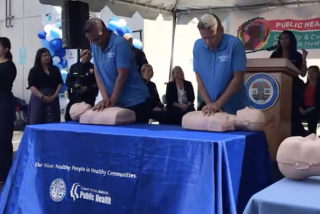Should family members watch as their dying loved ones get CPR?
- Share via
On “Grey’s Anatomy,” doctors steer family members out of the hospital room when they call a code blue and start performing CPR on a patient because it’s just too upsetting to watch. But in real life, doctors should be inviting family members to observe their attempts at cardiopulmonary resuscitation, researchers say.
A study published in Thursday’s edition of the New England Journal of Medicine found that family members who looked on as doctors performed CPR on their loved ones were far less likely to experience post-traumatic stress disorder three months later.
French doctors enrolled 570 relatives in their study. Some of them were asked whether they wanted to watch the proceedings, and 79% said yes. In the control group, medical teams followed their usual procedure, and 43% of relatives wound up witnessing CPR.
The researchers theorized that a close-up view of the resuscitation efforts might “help family members understand that everything possible to bring the patient back to life has been implemented,” they wrote. “In addition to quelling suspicion about behind-closed-doors resuscitation efforts and unrealistic expectations of such efforts, the family member’s presence may offer the opportunity for a last goodbye and help that person grasp the reality of death.”
Their theory appears to be correct. They found that the family members in the control group were 70% more likely to have PTSD 90 days later than those in the group that was invited to observe CPR. When they looked at the individual data, they found that family members who didn’t watch were 60% more likely to have PTSD than family members who did.
In addition, symptoms of anxiety and depression were more common among family members who weren’t present during CPR than among family members who were, the team reported.
And how did things go for the medical teams working on the patients? Despite concerns that hovering family members could be stressful for doctors and nurses and ultimately result in more lawsuits, neither of those things turned out to be the case. In fact, one of the family members that witnessed CPR wrote a thank-you letter to the research team.
Perhaps this comparison sums things up best: 12% of the family members who didn’t witness CPR later said they wished that they had, while only 3% of those who did watch regretted their decision.
You can read a summary of the study, Family Presence during Cardiopulmonary Resuscitation, online.
Return to the Booster Shots blog.
Follow me on Twitter @LATkarenkaplan







